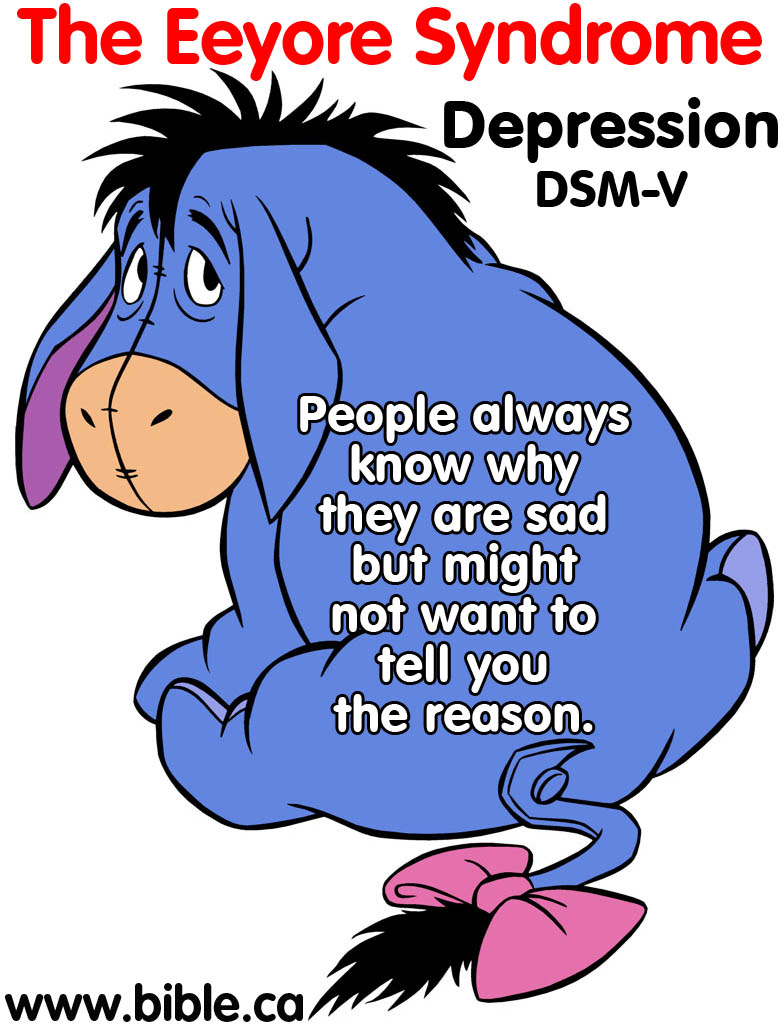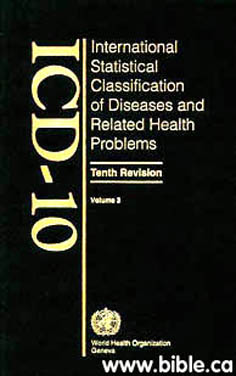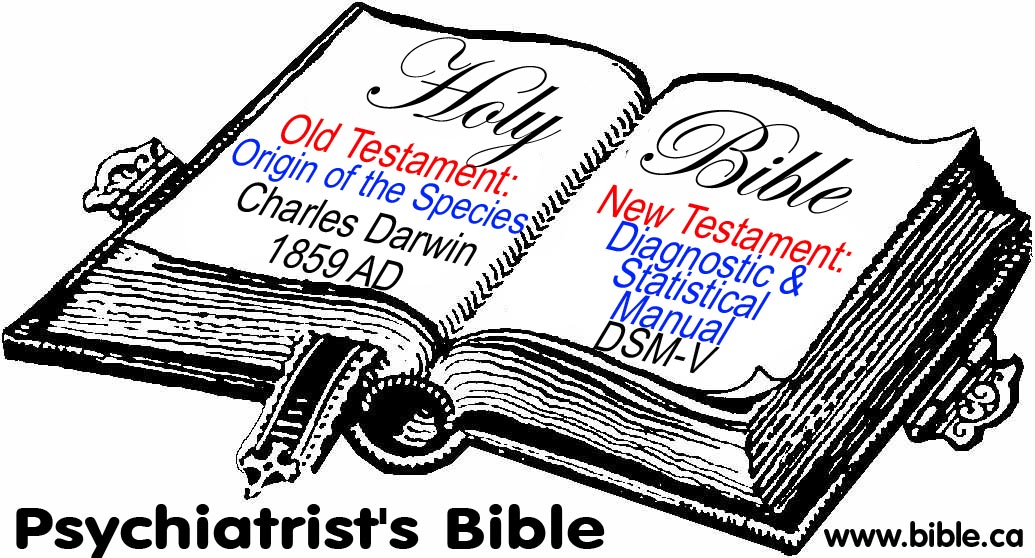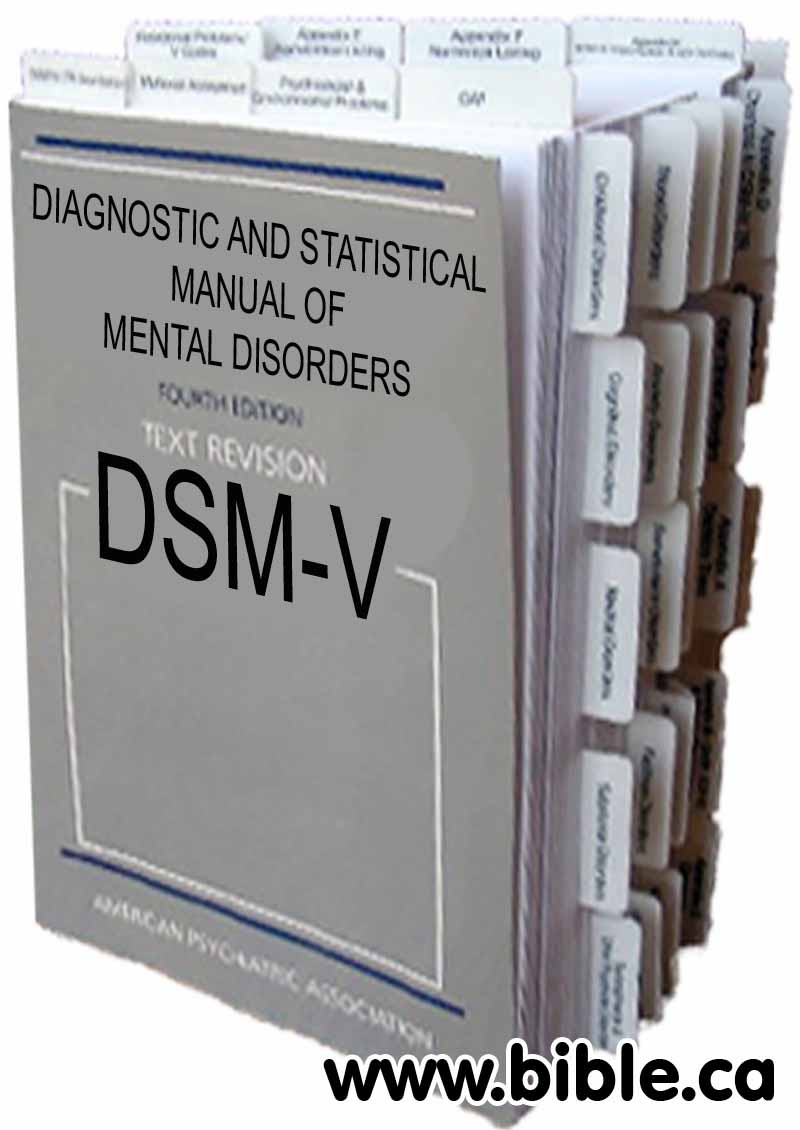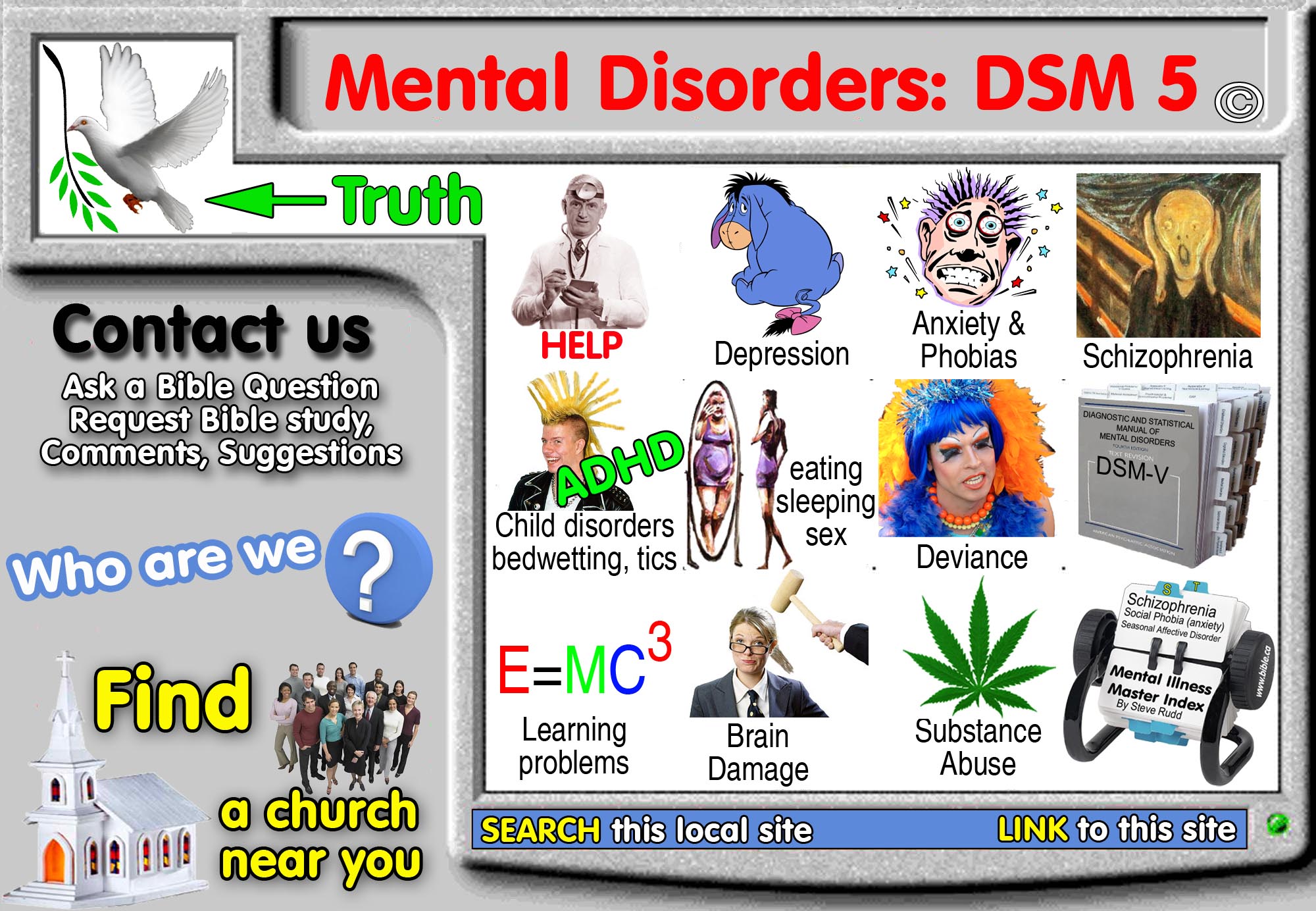DSM-IV, DSM-5, ICD-10: Depression, Bipolar (Manic-Depressive)
Depression is a sinful behaviour choice condemned by Jesus: "Leap for Joy" Luke 6:22-23
See the Case of Eeyore: (The Eeyore Syndrome: High self-esteem depression disorder)
|
|
|||
|
Depression, Bipolar F30-F39 Mood [affective] disorders Depression demonstrates a lack of hope in God. Bipolar is a behaviour choice.
See the Case of Eeyore (The Eeyore Syndrome: High self-esteem depression disorder) |
|||
|
|
|||
|
DSM-IV, DSM-5, ICD-10 International Classifications of Diseases Diagnostic and Statistical Manual |
|||
Introduction:
1. Research papers:
a. See our main page on Depression.
b. See our main page on Bipolar.
c. See our main page on Hysteria.
d. See our main page on High Self-esteem (The Eeyore syndrome)
e. See our main page on Anxiety
2. Historically, depression was called Melancholia.
3. Depression and Bipolar is a behaviour choice not a disease. Treating depression with drugs is like smashing a computer because of a software virus.
4. Depression is sadness and people are always depressed for a reason.
a. Often depressed people will say, "I have no idea why I am sad".
b. This is a lie. They know why, but if they told you, you would get mad at them.
c. This ides that people are depressed for "no reason" appears to support the false idea that depression is a medical condition that requires you to buy expensive drugs.
5. Drug companies advertise that depression is a serious medical condition, but this is a lie.
a. There is no medical test to detect depression. There are no blood tests to detect depression.
b. There is no known medical or chemical cause of depression.
A. Jesus Christ commanded us not to be depressed:
1. “Blessed are you when men hate you, and ostracize you, and insult you, and scorn your name as evil, for the sake of the Son of Man. “Be glad in that day and leap for joy, for behold, your reward is great in heaven. For in the same way their fathers used to treat the prophets.” (Luke 6:22-23)
2. Seven times in the book of Philippians we are commanded to rejoice!
a. “Rejoice in the Lord always; again I will say, rejoice! Let your gentle spirit be known to all men. The Lord is near. Be anxious for nothing, but in everything by prayer and supplication with thanksgiving let your requests be made known to God. And the peace of God, which surpasses all comprehension, will guard your hearts and your minds in Christ Jesus.” (Philippians 4:4-7)
3. Depression is often caused by the Eeyore syndrome, otherwise known as High Self-esteem. (also known as the Snuffaluffagus Disorder)
a. Jesus commands us to have low self-esteem and to be content in whatever circumstances we find ourselves.
b. When we have high self-esteem, we think we are entitled to more than what we have, so we get sulky and depressed about it and turn into an Eeyore or Snuffaluffagus.
B. Cases of depression and Bipolar:
|
Bipolar Disorder (BPD) |
|
|
Candy, Muffin, Abba, Potato, Egg, Deferred, River, Amnon See the Case of Eeyore: (The Eeyore Syndrome: High self-esteem depression disorder) |
|
|
Postpartum Depression (PPD) |
Conclusion:
1. Depression is a sinful behaviour choice and not a disease or medical condition.
2. Treating depression with drugs is like smashing a computer because of a software virus.
3. See the Case of Eeyore: (The Eeyore Syndrome: High self-esteem depression disorder)
4. Research papers:
a. See our main page on Depression.
b. See our main page on Bipolar.
c. See our main page on Hysteria.
d. See our main page on High Self-esteem (The Eeyore syndrome)
e. See our main page on Anxiety
5. A depressed Christian is an oxymoron like "jumbo shrimp". Christians, by nature are to rejoice and not be depressed or sad.
|
DSM-IV, DSM-5, ICD-10: Depression, Bipolar (Manic-Depressive) |
F30-F39 Mood [affective] disorders
F30 Manic episode
F30.0 Hypomania
F30.1 Mania without psychotic symptoms
F30.2 Mania with psychotic symptoms
F30.8 Other manic episodes
F30.9 Manic episode, unspecified
F31 Bipolar affective disorder (See our main page on Bipolar)
F31.0 Bipolar affective disorder, current episode hypomanic
F31.1 Bipolar affective disorder, current episode manic without psychotic symptoms
F31.2 Bipolar affective disorder, current episode manic with psychotic symptoms
F31.3 Bipolar affective disorder, current episode mild or moderate depression
F31.4 Bipolar affective disorder, current episode severe depression without psychotic symptoms
F31.5 Bipolar affective disorder, current episode severe depression with psychotic symptoms
F31.6 Bipolar affective disorder, current episode mixed
F31.7 Bipolar affective disorder, currently in remission
F31.8 Other bipolar affective disorders
F31.9 Bipolar affective disorder, unspecified
F32 Depressive episode (See our main page on Depression)
F32.0 Mild depressive episode
F32.1 Moderate depressive episode
F32.2 Severe depressive episode without psychotic symptoms
F32.3 Severe depressive episode with psychotic symptoms
F32.8 Other depressive episodes
F32.9 Depressive episode, unspecified
F33 Recurrent depressive disorder
F33.0 Recurrent depressive disorder, current episode mild
F33.1 Recurrent depressive disorder, current episode moderate
F33.2 Recurrent depressive disorder, current episode severe without psychotic symptoms
F33.3 Recurrent depressive disorder, current episode severe with psychotic symptoms
F33.4 Recurrent depressive disorder, currently in remission
F33.8 Other recurrent depressive disorders
F33.9 Recurrent depressive disorder, unspecified
F34 Persistent mood [affective] disorders
F34.0 Cyclothymia
F34.1 Dysthymia
F34.8 Other persistent mood [affective] disorders
F34.9 Persistent mood [affective] disorder, unspecified
F38 Other mood [affective] disorders
F38.0 Other single mood [affective] disorders
F38.1 Other recurrent mood [affective] disorders
F38.8 Other specified mood [affective] disorders
F39 Unspecified mood [affective] disorder
By Steve Rudd: Contact the author for comments, input or corrections.
Send us your story about your experience with modern Psychiatry
